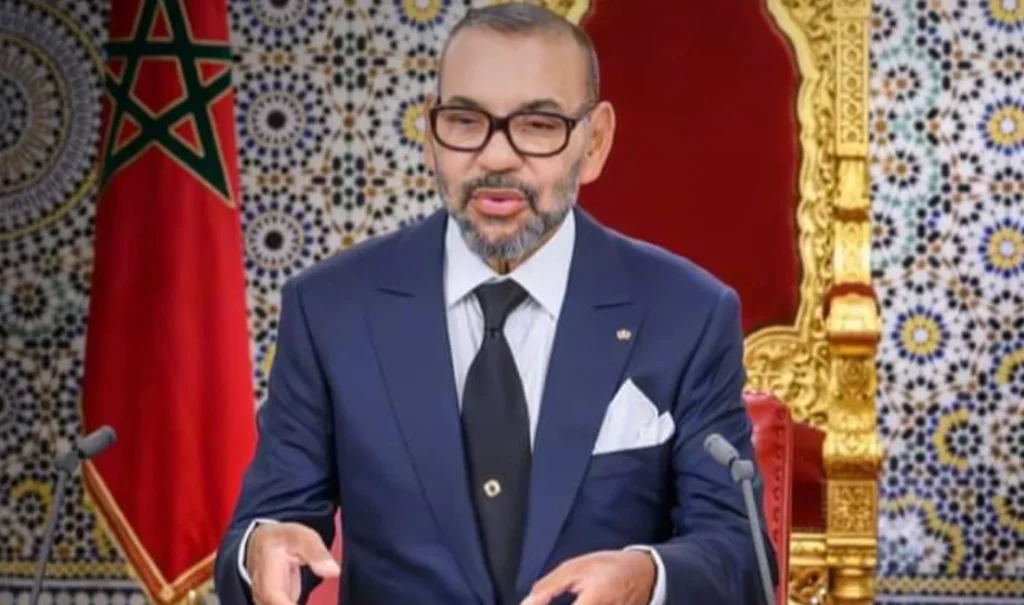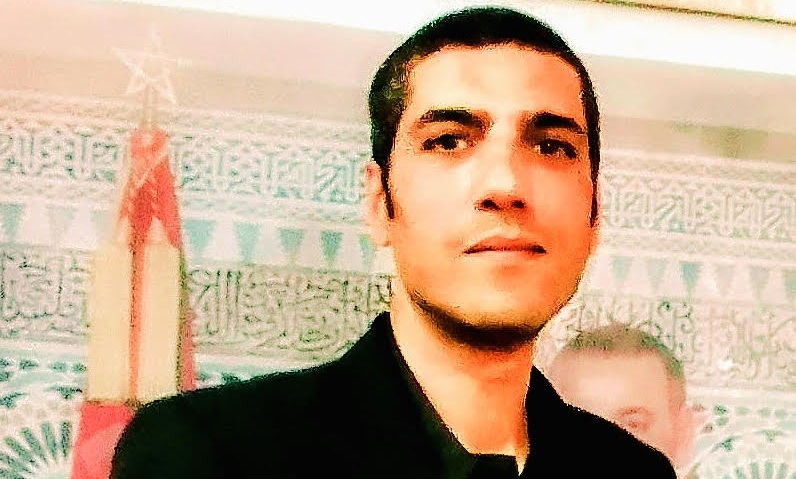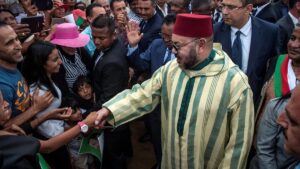Between an outstretched hand and diplomatic isolation, Morocco advances while Algeria stagnates over the Sahara issue.

Mohamed Azouz (Moroccan writer and journalist)
Every year, the anniversary of King Mohammed VI's accession to the throne of his glorious ancestors is renewed, and with it, the Kingdom of Morocco's unwavering message regarding its national issues and its regional environment is renewed. The "extended hand" invitation extended by His Majesty the King to Algeria has been a fundamental pillar of Morocco's foreign policy, affirming the Kingdom's insightful vision for re-establishing bridges of dialogue and understanding in the Maghreb region. This vision did not emerge from a vacuum; rather, it is part of an integrated strategy adopted by Morocco to resolve the Western Sahara issue once and for all, through strong and realistic diplomacy that strengthens its regional and international standing.
His Majesty the King's speeches embody a balanced diplomacy that combines firmness in defending national sovereignty with openness to responsible dialogue based on overcoming the artificial differences that have hindered Maghreb cooperation. The call to turn the page on the past and forge relations that derive their strength from a shared history contributes to enhancing security, stability, and development in the entire region.
The "extended hand" reflects a strong will to restore trust between the two countries, while emphasizing the adoption of practical and serious approaches to achieving comprehensive peaceful solutions to conflicts that meet the aspirations of the region's peoples for security and prosperity. This position expresses Morocco's deep awareness that Algeria's stability is a fundamental pillar of regional security and development, and that resolving existing tensions represents a necessary step toward strengthening Maghreb cooperation.
This initiative is part of a comprehensive strategy aimed at creating a positive dynamic in bilateral relations, including deepening political dialogue, developing economic cooperation, and enhancing cultural exchange, within the framework of a wise royal vision that sees Algeria's strength and stability as serving the interests of the entire region. Given the economic and social conditions facing Algeria, the "extended hand" carries a message of peace and genuine reconciliation, restoring consideration to the supreme interests of the peoples of both countries and laying the foundations for a shared future built on understanding and constructive cooperation. This model represents the pinnacle of maturity and diplomatic realism that has characterized Morocco's approach to the Western Sahara issue.
In contrast, Algeria is witnessing mounting diplomatic isolation at the regional and international levels due to its intransigent positions on the issue of our territorial integrity and the Moroccan Sahara. Political and international support for its demands has declined significantly, in contrast to the significant diplomatic gains achieved by Morocco through a balanced strategy based on wisdom and realism, which has strengthened its position as a respected regional actor and reliable international partner. This isolation reflects the weakness of Algeria's position and the erosion of its influence. Algerian support is now limited to countries with limited political and economic weight, while the circle of recognition of Morocco's sovereignty over its southern provinces is expanding, including the opening of international consulates within Morocco.
Moreover, the Algerian crisis is manifested in the loss of its international credibility due to its adherence to a futile and escalatory approach and its rejection of UN resolutions calling for a consensual political settlement. This makes it appear as a party obstructing peace efforts, unlike Morocco, which adheres to constructive diplomacy and dialogue. Algeria's continued support for the Polisario Front, despite the fragility of this international coverage, reflects the regime's insistence on exploiting the issue for internal crises, which entail mismanagement of resources and the neglect of national development priorities.
US President Donald Trump's recent message, reiterating the United States' recognition of Morocco's sovereignty over the Western Sahara and its strong support for the autonomy proposal as the sole solution to the conflict, represents a pivotal strategic step that reflects profound shifts in the geopolitical landscape. This renewed American affirmation is not merely a matter of diplomatic protocol; it demonstrates a pragmatic realism based on the importance of consensus and practical solutions that ensure stability and development.
Trump's declaration that Morocco's autonomy proposal is "serious, credible, and realistic" has undermined the justifications of the Polisario Front and its supporters, and has weakened efforts at political partition and fragmentation. American support has evolved from tacit endorsement to realistic economic and development partnerships in the southern provinces, making recognition not just a passing political card, but a long-term strategic commitment that integrates the region into a comprehensive development framework, transforming it from a blackmail card into a platform for investment and economic dynamism.
This position also reflects a development in Morocco's relations with the United States, which are based on a comprehensive vision for regional peace and security. This step represents a strong boost for Moroccan diplomacy, which has employed patience, wisdom, and realpolitik in presenting the autonomy policy as a rational framework that guarantees the rights of the Sahrawi people and grants them a national identity within a unified and cohesive Moroccan state. It also confirms the end of the exploitation of the Sahara issue for political agendas, which has exacerbated the situation of thousands of Sahrawis.
The Algerian regime faces a complex psychological and political challenge that prevents it from reversing its rejectionist positions, despite shifting international and diplomatic realities that confirm growing recognition of Morocco's sovereignty over this territory.
This psychological barrier is represented by the difficulty of declaring any concession to Algerian public opinion, given the vital importance of the conflict to national identity and sovereignty. Any admission of "defeat" on this issue could threaten the cohesion of the internal regime, especially in light of the growing social and political polarization. It is no secret to the Algerian side that its failure to manage this issue could lead to popular uprisings or crises that could culminate in the collapse of the regime, something international powers such as the United States and France are keen to prevent to ensure regional stability.
In contrast, Morocco prefers the Algerian regime to remain stable, which prompts it to pursue a balanced strategy based on dialogue and mediation, providing opportunities to save Algeria's face and shielding the region from dramatic upheavals with potentially negative consequences. With the continued mounting economic pressures on Algeria, resulting from a deep crisis that has accumulated over years, coupled with the loss of traditional international support for the secessionist cause, the likelihood of the regime entering a phase of reassessment of its positions increases, whether through escalation to preserve national unity or a gradual retreat through international mediation accompanied by potential economic and political settlements.
The future holds multiple possibilities, beginning with a cautious political maneuver aimed at minimizing domestic repercussions and extending to fundamental changes in the structure of the Algerian regime, which may emerge as economic and social conditions deteriorate. In all these scenarios, the best option, given the interests of both parties and the region, remains a peaceful solution that ensures stability and development, avoiding a slide into open crises that could undermine regional security.
The Algerian regime faces complex psychological and political challenges that prevent it from backing down from its rejectionist positions, despite major shifts on the international and diplomatic scene that demonstrate growing recognition of Morocco's sovereignty over the Sahara. This psychological barrier lies in the extreme difficulty the regime faces in announcing any concessions to public opinion, given the vital dimensions of the conflict related to national identity and sovereignty. Admitting any "defeat" could threaten the regime's internal cohesion, especially in light of the escalation of multiple social and political polarizations.
The Algerian regime is well aware that its failure to manage this issue could lead to popular uprisings and deep crises, potentially leading to the collapse of state institutions. This is something major international powers, including the United States and France, seek to avoid in order to preserve regional stability. Conversely, Morocco prefers the stability of the Algerian regime, which prompts it to adopt a balanced strategy based on dialogue and mediation, allowing Algeria to save face and avoid destabilizing the region.
With the increasing economic pressures on Algeria, resulting from crises accumulating over the years, and the loss of traditional international support for the secession cause, the chances are increasing that the regime will enter a phase of reassessment of its positions. This could occur either through political escalation aimed at preserving national unity, or through a gradual retreat supported by international mediation and potential consensual economic and political solutions.
And a year comes 2025 This is a pivotal and decisive year for this issue, as attention turns to the possibility of resolving the conflict once and for all through negotiations based on the autonomy initiative under UN supervision, amid a marked decline in international support for the Polisario Front. This paves the way for achieving permanent stability and full Moroccan sovereignty over its Sahara.
The future holds multiple possibilities, beginning with political maneuvers aimed at mitigating the internal effects of the crisis and extending to fundamental changes in the structure of the Algerian regime, which may unfold as economic and social conditions deteriorate. In all scenarios, a peaceful solution remains the best option, serving the interests of all parties, ensuring regional stability and development, and preventing it from slipping into open crises that could undermine regional security and peace.
Morocco's strategy for resolving the Western Sahara issue emphasizes that the solution lies in realism and cooperation, not in rigid positions and artificial conflicts. Through its wise policies, the Kingdom has proven itself a reliable regional player and a strategic partner in building security and development. In light of these transformations, the best option remains for Algeria to recognize that its true interest lies in cooperating with its neighbors and placing the interests of the peoples of both countries above all else, to build a prosperous Maghreb future characterized by security and stability.






